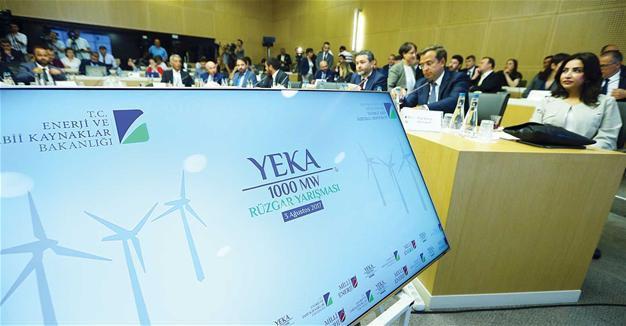Siemens and Turkish partners win billion-dollar wind energy tender
ANKARA

A consortium of German giant Siemens and Turkey’s Türkerler and Kalyon Enerji holdings won a billion-dollar wind energy tender on Aug. 3, offering the lowest price to the state with $3.48 cents per kilowatt hour.
A consortium of Chinese company Mingyang and Turkish company İlk İnşaat competed until the end of the reverse auction before getting eliminated, quitting in the 30th round.
The tender came at a time when Turkish economy officials accelerated efforts to tone down a recent row with Germany, vowing that German investments in Turkey were safe and citing a “communication mistake” for reports about an anti-terror probe against hundreds German companies in the country.
“The tender ended with a win by German company Siemens. We can say that this picture sends an important message to the region and the world,” Energy Minister Berat Albayrak told the media after the auction.
“When the 200-year-old cooperation between Turkey and Germany is considered, I think this result will make an important contribution to Turkish-German relations,” he added.
Eight consortia, including four German giants, participated in the Energy Ministry’s 1,000-megawatt (MW) wind power project tender on July 27.
In addition to the German and Chinese firms, Danish Vestas also took part in the bidding, as well as the U.S.’s General Electric, along with their local partners.
The winning consortium is expected to make an investment of more than $1 billion in the project, which stipulates the gradual local production of wind turbines.
Albayrak said the locally produced turbines would be installed by early 2019 and added that the price was a record.
For his part, Siemens Gamesa Turkey CEO Hakan Yıldırım noted that the company has been active in Turkey for the past 160 years.
“We will do whatever we can to cut the unit price for electricity,” Yıldırım said.
Some 64 percent of the project, YEKA, will be domestic, while 35 percent of the necessary equipment will be imported, said Türkerler Chair Kazım Türker, the construction firm in the wining consortium.
“We plan to finance the equipment from foreign resources and use local banks for the remainder,” Türker added.
Kalyon Holding Energy Group Chairman Murtaza Ata described the tender as “strategic.”
“This tender will help Turkey cut a further 1,000 MW from Turkey’s foreign dependency in electric power,” he said, adding that it was also strategic for Turkish companies to produce such technology.
Gürkan Kumbaroğlu, the chair of local Energy Economy Association, said the tender could be an offer of “oil branch” in Turkey-German ties.
The deal comes amid turbulence in relations between Turkey and Germany. In an interview with weekly magazine Der Spiegel published on July 29, Deputy Prime Minister Mehmet Şimşek stressed that no German firms were being probed by Turkish investigators, amid ongoing investigations into the Fethullahist Terrorist Organization (FETÖ), believed to have organized last year’s attempted military takeover.
“When I saw reports in the media about a list of companies, I immediately called the interior and justice ministers,” Şimşek said, referring to German media reports last week that hundreds of German companies were being investigated by Turkish authorities on suspicion of “supporting a terror organization.”
“Both ministers assured me that there has been no investigation against a single German company on suspicion of terrorism financing,” Şimşek added.
He said the Turkish authorities had requested relevant information from all countries via Interpol, as part of their investigation into the international business ties of local firms owned by individuals linked to FETÖ.
Şimşek said foreign companies were not the focus of the anti-terrorism investigation and this information request aimed to assist the probe focused on the economic activities of the terrorist group.
“In the list there were 9,800 companies, not only from Germany but from more than 50 countries. There is no investigation against any of these foreign companies. Nevertheless, we have decided to withdraw this list in order to prevent another misunderstanding,” he added.
Economy Minister Nihat Zeybekci said the reports were the result of an “obvious misunderstanding” and a “communication mistake.”
Relations between Turkey and Germany have been shaken since early this year, when the latter banned Turkish ministers’ campaigning in its territories before the April 16 constitutional referendum. The arrest of Turkish-German journalist Deniz Yücel in February and of human rights activist Peter Steudtner in July, as well as Ankara’s refusal to let a group of German lawmakers visit their troops at the İncirlik Air Base in southern Turkey have also fueled the dispute.
The deal for the wind energy tender in Turkey came on the same day as German conglomerate Siemens confirmed its full-year forecast on Aug. 3, after a third quarter that saw revenues and profits increase even though large orders fell.
The group reported a 7-percent increase in net profit to almost 1.5 billion euros ($1.8 billion) in the third quarter of its financial year between April and June, beating analysts’ forecasts of around 1.3 billion euros.
Revenues at Siemens, whose products range from wind turbines to trains to medical equipment, grew by 8.0 percent to reach 21.4 billion euros.
But the group reported a 6-percent fall in overall orders, mainly driven by fewer large contracts for its power and gas and wind power units.
 A consortium of German giant Siemens and Turkey’s Türkerler and Kalyon Enerji holdings won a billion-dollar wind energy tender on Aug. 3, offering the lowest price to the state with $3.48 cents per kilowatt hour.
A consortium of German giant Siemens and Turkey’s Türkerler and Kalyon Enerji holdings won a billion-dollar wind energy tender on Aug. 3, offering the lowest price to the state with $3.48 cents per kilowatt hour.